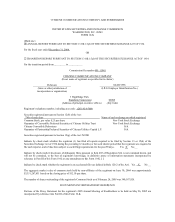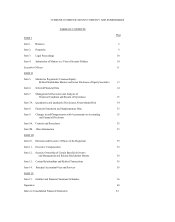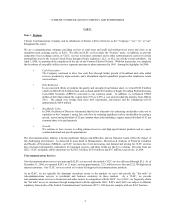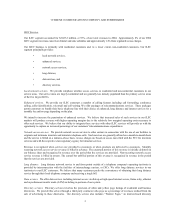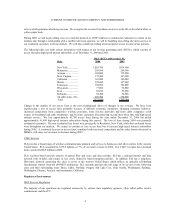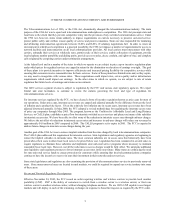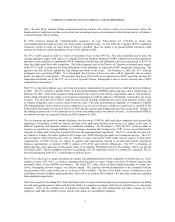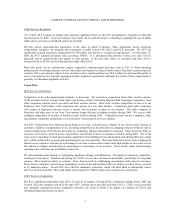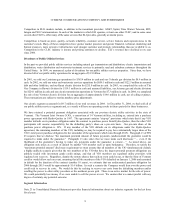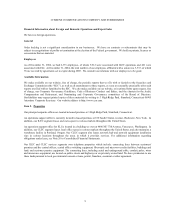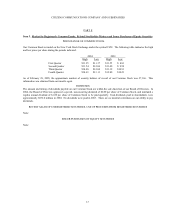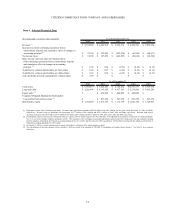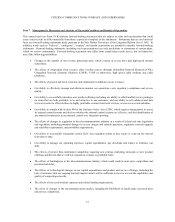Frontier Communications 2004 Annual Report Download - page 8
Download and view the complete annual report
Please find page 8 of the 2004 Frontier Communications annual report below. You can navigate through the pages in the report by either clicking on the pages listed below, or by using the keyword search tool below to find specific information within the annual report.CITIZENS COMMUNICATIONS COMPANY AND SUBSIDIARIES
6
LNP will most likely promote further competition between wireline and wireless carriers in an environment where the
displacement of traditional wireline services has been increasing because of technological substitutions such as cell phones,
e-mail and Internet phone calling.
In 1994, Congress passed the Communications Assistance for Law Enforcement Act (CALEA) to ensure that
telecommunication networks can meet law enforcement wiretapping needs. In June 2004, the Company filed for additional
extensions of time to make our entire network CALEA compliant. However, failure to be granted further extensions could
increase our budgeted capital expenditures by up to $6.2 million in 2005.
The FCC in 2003 issued an order as a result of its triennial review of the 1996 Act. The order essentially kept in place the
existing regulatory regime with respect to Unbundled Network Elements Platform (UNEP) competition, provided significant
authority to state regulators to implement UNEP competition and pricing, and eliminated a previous requirement of ILECs to
share their high-speed lines with competitors. The Federal appeals court in the District of Columbia overturned many aspects
of the FCC’s order, in particular the broad delegation to state authorities to implement UNEP competition and pricing. The
appeals court did, however, uphold the line sharing provisions of the order. On February 4, 2005, the FCC released
permanent rules governing UNEPs. It is anticipated that portions of these new rules will be appealed, and we cannot
predict the impact of such appeals. We anticipate that there will be little or no impact on our ILEC operations because the
impairment thresholds set by the FCC are at a level beyond Citizens’ demographics and we do not currently have UNEP
competition in our markets.
The FCC is expected to address issues involving inter-carrier compensation, the universal service fund and internet telephony
in 2005. The FCC adopted a Further Notice of Proposed Rulemaking (FNPRM) addressing inter-carrier compensation on
February 10, 2005. Some of the proposals being discussed with respect to inter-carrier compensation, such as “bill and keep”
(under which switched access charges and reciprocal compensation would be reduced or eliminated), could reduce our access
revenues. The universal service fund is under pressure as local exchange companies lose access lines and more entities, such
as wireless companies, seek to receive monies from the fund. The rules surrounding the eligibility of Competitive Eligible
Telecommunication Carriers such as wireless companies to receive universal service funds are expected to be clarified by the
Federal State Joint Board on Universal Service in 2005 and the outcome may heighten the pressures on the fund. Changes in
the funding or payout rules of the universal service fund could further reduce our subsidy revenues. As discussed in MD&A,
our subsidy revenues are expected to decline in 2005 compared to 2004.
The development and growth of internet telephony (also known as VOIP) by cable and other companies has increased the
importance of regulators at both the federal and state levels addressing whether such services are subject to the same or
different regulatory and financial schemes as traditional telephony. On November 9, 2004, the FCC issued an order in
response to a petition by Vonage Holdings Corp. (Vonage), declaring that Vonage-style VOIP services are jurisdictionally
interstate in nature and are thereby exempt from state telecommunications regulations. The FCC stated that its order was
not limited to Vonage, but rather applied to all Vonage-type VOIP offerings provided over broadband services. The FCC
did not address other related issues, such as: whether or under what terms VOIP traffic may be subject to intercarrier
compensation; if VOIP services are subject to general state requirements relating to taxation and general commercial
business requirements; or whether VOIP is subject to 911, USF, and CALEA obligations. The FCC is planning on
addressing these open questions in subsequent orders in its ongoing "IP-Enabled Services Proceeding," which was opened
in February 2004.Internet telephony may have an advantage over our traditional services if it remains less regulated. We are
actively participating in the FCC’s consideration of all these issues.
The FCC's revised service outage reporting rules require telecommunications providers (regardless of whether they are cable,
satellite, wireless, SS7, E911, or wireline communications providers) to report outages of at least 30 minutes duration that
potentially affect at least 900,000 user-minutes. The initial FCC order, which included required reporting of certain non-
service interrupting network outages, was partially stayed. The required network modifications to be compliant with the
stayed portion of the order would cost us in excess of $16.0 million. The New York Public Service Commission is also
considering network reliability requirements that could cost us as much as $65.0 million. We and other carriers are opposing
these proposed requirements.
Some state regulators (including New York and Illinois) have recently considered imposing on regulated companies (including
us) cash management practices that could limit the ability of companies to transfer cash between subsidiaries or to the parent
company. None of the existing state requirements materially affect our cash management but future changes by state
regulators could affect our ability to freely transfer cash within our consolidated companies.

